What does work look like today? In this episode, the Fellows talk about their work and passions. You’ll hear about some of the ways in which their work challenges them, about issues and topics that excite them, and some stories from first days on the job.
You can enjoy the episode in its entirety or listen to segments from particular Fellows.
Frank 5 Episode 1 (Work): Full Episode
What does work look like today? In this episode, the Fellows talk about their work and passions.
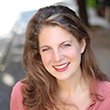 “I didn’t think about doing theatre professionally. It was a hobby for me.”
“I didn’t think about doing theatre professionally. It was a hobby for me.”
Nell Bang-Jansen ’11 speaks with Professor Tim Burke.
Nell is a Philadelphia-based theater director and creator and is currently working on a theater piece made with and for people who work as caregivers.
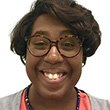 “My first day of teaching, I got cussed out by a parent.”
“My first day of teaching, I got cussed out by a parent.”
Kimberly St. Julian-Varnon ’12 speaks with Professor Sa’ed Atshan.
Kimberly is a high school history teacher and community college professor. She’s also a Texan, African-American woman, Russian-speaker, and Magic the Gathering player.
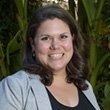 “I truly feel like I learn something new every day.”
“I truly feel like I learn something new every day.”
Kara Peterman ’09 speaks with Professor K. Elizabeth Stevens.
Kara is a structural engineering experimentalist who joined the department of Civil and Environmental Engineering at UMass Amherst in 2016. She is passionate about outreach and has promoted the advancement of underrepresented groups in engineering for over a decade.
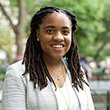 “There’s a whole network of data scientists that I work with.”
“There’s a whole network of data scientists that I work with.”
Marissa Davis ’08 speaks with Professor Rachel Buurma.
Marissa is a bridge-figure, social engineer and advocate for creating sustainable pathways to a better quality of life for historically disenfranchised communities.
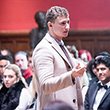 “I work at a nonprofit I started as a senior at Swarthmore.”
“I work at a nonprofit I started as a senior at Swarthmore.”
Sam Sussman ’13 speaks with Professor Krista Thomason.
Sam is the co-founder of Extend, a start-up NGO focused on conflict resolution education in Israel-Palestine. He’s also an award winning screenwriter.
Frank 5 Episode 1 (Work): Transcript
Tim Burke: It’s the Frank 5 Fellows podcast series. Informal conversations with recent liberal arts grads from business, engineering, education and the arts. In this episode, the Fellows and their faculty partners talk about their work and passions. You’ll hear about some of the ways in which their work challenges them, about issues and topics that excite them, and some stories from their first days on the job.
Up next, Nell Bang-Jensen and Tim Burke.
Burke: You thought you were going to do theater when you arrived at college?
Nell Bang-Jensen: I didn’t, actually. I really enjoyed it in high school and elementary school and middle school. It was a hobby for me, and I didn’t really think about doing it professionally, in part because I think before college, my academic interests actually felt very separate from theater. I would go to classes and then go to drama club, and it was exciting and fun, but it wasn’t stimulating to me in any kind of intellectual way. I think I may have told this story that at my high school, the director would actually at call-backs line us up by height next to the boys she was also calling back in order to determine who would get what part. That’s sort of what the art-making classes looked like.
When I got to Swarthmore and took Quinn Bauriedel’s Acting 1 class, then his movement theater classes as well as many other classes in that department, I realized that there’s a whole different way of thinking about it and being authors of the work and creating something new and exciting that had never been done before and was built from the people in the room and the ideas they were exploring in their lives. That was really new and really exciting and on an intellectual level as well. It was sort of the first time I realized, okay, there’s a way of being in this field that actually gets at all of the questions that I’m interested in and isn’t just a hobby or something that feels good because people clap for you, but there’s a way of really using this as a medium to question certain views and create community.
Burke: That’s a really big leap in terms of what you liked about or were drawn to when you thought about drama and theater. Now that you’re working professionally in the field on the other end of things, have you discovered a third reason or a different reason yet again to like it or feel drawn to it?
Bang-Jensen: Yeah. I think that’s an ongoing process. I think in the arts especially because there’s a lot of frequency of transition. There’s many moments where I finish one project and sort of have this moment of breath before starting another. Often, in those moments you kind of have to ask yourself, “Okay, do I want to keep going with this?” just because you’re often confronted with instability and lack of financial certainty. I think a lot of artists have to ask themselves those questions all the time, “What is my commitment to it? Why am I doing this? Am I any good at this?” all of those questions that I think anyone asks themselves, but I think because there’s breaks in our work, perhaps we do more frequently.
I’ve been thinking about that a lot. I knew I loved being in a rehearsal room and making the work and creating a community and sharing ideas with an audience. Then, when working at the Wilma Theater, which is a pretty large regional theater, I realized I was also interested in exploring purpose in theater and how an organization as a whole is creating a mission or serving the city and community that they’re in. Both in terms of the art-making, but also in what are the dynamics with the staff? Who’s part of this conversation in terms of inclusion and diversity and equity? Why are we making this work and who is it for? I became really interested in those questions, which is why now I’m exploring this path of artistic leadership, because I realized I both liked the art-making part and also thinking about our field as a whole and how theater can really be a mode of creative and community.
Burke: Up next, Kimberley St. Julian-Varnon and Sa’ed Atshan.
Sa’ed Atshan: Tell me about your first day at your first job when you arrived. I guess your first job in your current job as a teacher.
St. Julian-Varnon: My first job as a secondary teacher in Texas.
Atshan: Your first day, do you remember that?
St. Julian-Varnon: I do remember that. So, my first year teaching I taught at the high school down the street from the high school I grew up going to and they were our arch rivals. We hated them and I applied there and I got the job and so my first day was also Meet the Teacher Night.
So, I was really nervous. It was insane, I’m like, they’re just giving me these students and I’m responsible for them. I’m 24, like, what is this? I lost the hand outs I made for my first period class. I accidentally gave the wrong class the wrong homework and my kids took a quiz and I put in the grades, not understanding for the first AP US History quiz, you really need to curve it because you’re gonna scare so many of them off.
So, I got a lot of kids who were concerned about their grades by the end of the day and then the parents came to Meet the Teacher Night and one parent was very unhappy with me because of a summer assignment that the previous teacher assigned, I hadn’t assigned it.
So, I got cussed out on my first day of school by an angry parent at Meet the Teacher Night. SO, yeah it was interesting.
Atshan: Quite an adventure. So, what do you most like about your work and why?
St. Julian-Varnon: I like the kids and it’s one of those things where I teach my AP World History dual credit students. These are people at the top of their class, they’re going to college, but I also teach kids who have gone to jail and so I get to see the full spectrum, but I get to make individual connections with those kids. I have my past students, return students, I am their go-to person for college stuff. They come to me when they need help, if they’re not understanding the application, I’m their go-to person. They don’t even go to their counselor, they come to me.
I love that because I was in that position at their age in the same high school and I didn’t have that so I know how important that is. But on the other hand, I have also helped some of my kids get ready for their court dates to help keep them out of jail for something they did when they were just being stupid and not thinking.
So, I get to be both and I like doing both.
Burke: Up next, Kara Peterman and K. Elizabeth Stevens.
Elizabeth Stevens: So, what do you like most about your work, your teaching in particular.
Kara Peterman: So, I can say that about the work in general, I truly feel like I learn something new every day. That’s a common refrain from people who like their jobs. I feel like I can be learning about a topic I never even expected to learn about in my entire life in one day. Where especially the questions my students ask me, I can prepare my lecture, I can study my notes, and I can still never anticipate their questions. And so, that has taught me to be a quick thinker, but then also think about all the possible ways a student can come into the class, you know. What types of knowledge they have, what types of learning environments they come from, how they learn, how they see problems, and it’s continually interesting for me to see how they approach things, and then try to adjust my sort of spectrum of possible questions when I teach the same subject again.
Stevens: I know you do assessments, structural engineering assessments, right?
Peterman: Mm-hmm (affirmative).
Stevens: Can you say, just describe what that is a little bit? You go on site visits?
Peterman: Yeah. It’s something that we introduce every young engineer to, and I was introduced to this at Swarthmore. But even just a simple visit to a site under construction, to look at how it’s being put together, and the choices that are made on site, and how one site differs from another. One thing I’ve begun to do now as a professor, now as an academic, is you know, for example, I was recently down in coastal Texas doing hurricane reconnaissance as part of an NSF team of researchers. And, we went down to the areas with the highest wind speeds. Not to be confused with the areas with the most flooding. The two were actually in different locations for this hurricane. We went around and did basically three days of surveying of structures that had failed, or collapsed, or been damaged by these high winds. That was a kind of a watershed moment in my own career, because it was a very practical, very immediate, very necessary thing that I could offer, thanks to all of the years of school.
And so, that’s one example of things that we do. And of course, engineers in general in the field, and engineers who go and they get jobs as design engineers, that could be rehabilitation, that could be designing new things, and we’ve always tried to incorporate that into the education, whether it’s going to a lab to actually see an experiment, or whether it’s going to a site to talk to an owner. I have found in my own life, and my students find, and we continue to promote that nothing quite beats seeing it in person, and talking to the person around them, because the human elements, the human errors, the human factors are ultimately what dictates the success or failure of a structural design, or the success or failure of an experiment, or the success or failure of a new construction. So, we definitely tried to sort of impart that.
While the textbooks are correct, while researchers may agree on everything, ultimately the work doesn’t get used, or the work doesn’t get used correctly, if it’s not fully vetted to the end person. You know, the actual person living in, or using the structure. So, kind of a roundabout way of explaining that type of assessment in that part, but as I said, in my own career it’s everything from going to a construction site to actually see what’s happening, to doing a test and talking to the people doing a test to see what they’re doing, and then also post-disaster, being useful at tracking damage, and talking to the owners, and talking about what they experienced during the event.
Burke: Up next, Marissa Davis and Rachel Buurma.
Burma: How did learning about how to value the importance of being a piece of a larger organizational structure translate into the work that you’re still doing today?
Davis: Great question. For some more context on what it is that I do, there is in fact a whole network of data scientists that I work with who use their services, their skills, in service of social good by working with some mission driven organizations that are sometimes non-profits, but they are sometime for-profit entities that have some kind of social good arm that they’re doing. Using data science, largely machine learning, artificial intelligence, and other data product to help that organization be more impactful in the work that they’re doing.
My specific role is to be in between the chapter leaders who lead our six chapters of data scientists around the world, and our overall community of all of those individuals and the data science volunteers they work with, which is a fuller community of over 14,000 individuals. Thinking about what it takes for all of us to be aligned with the mission that is coming out from the head of our organization, from the board, and really thinking about what it will take to execute that.
Burke: Up next, Sam Sussman Davis and Krista Thomason.
- Thomason: So how about telling me about your first day in this job?
- Sussman: Okay. So it’s a slightly tricky question. So right now, I work at Extend, which is a nonprofit organization I started as a senior at Swarthmore, and we run educational programming in Israel-Palestine, mainly for American Jewish organizations, but also for other groups. And we try to create a sort of balanced, comprehensive program where people are hearing from both Israeli and Palestinian school, society, political, business, human rights leaders. So it’s difficult to sort of find the intellectual middle ground there and to sort of run a program that balances out the enormously wide range of perspectives that you find.
So did I have a first day? I don’t know. I can tell you about the first … The first program we ran was in June 2013, just about two weeks after I graduated Swarthmore. And something happened on that trip that taught me a lot about this sort of work.
So me and my partner who started the organization with me had scheduled out a very specific five days of experiences in Israel and Palestine, and we were really proud of the range of the people that we’d gotten to sign up to do this inaugural tour for us. And on the last night we were in Ramallah, and we were at this beautiful outdoor bar, it was the summer, gorgeous evening. And we had set this time aside, just for reflection for the 12 groups of people in program. We were just gonna sit around, have some beers and talk about, “What did we learn? What changed? How did the way that we relate to this region emotionally, intellectually, culturally develop in these five days?”
What we hadn’t realized was that that night was the final for Arab Idol, the largest singing contest in the Middle East and North Africa. And it just so happened that a Palestinian speaker was in the final round. And slowly, as we kind of started having this conversation, the bar just filled up and filled up and filled up. And suddenly it was so packed you could hardly move, no one could hear anything, and everyone was cheering, cheering, cheering as this Palestinian speaker who’d come from Gaza in the final round, as he ultimately took the world by storm and he won Arab Idol. And it was …
In a country that doesn’t have, often politically or culturally, so many reasons or so many opportunities to be recognized and to be celebrated, this was like the greatest celebration. It was as if the New York Yankees won the World Series three times in a row. I’ve been in New York for those parades — back in the days when the Yankees actually won the World Series. And Ramallah was like that 10 times over. Everyone honking.
I remember some of the people in the program who had sort of been most … they’ve been sort of the most skeptical to listening to views different than their own. I remember this one kid sticking his head out of the top of a taxi cab that was driving through the streets of Ramallah, honking. I remember this kid yelling, “YEAH!” Right? I remember thinking, “Okay, as the program leader, I really want this kid to put his head back inside the taxi, but I think this is also one of the most unique of cultural exchange I could have ever hoped for for this young man. So I’m not gonna tell him to put his head back inside the taxi.”
So, that was an important experience and just sort of learning that you can’t always choose the moments that change the way that people think and feel.
Thomason: Right. There’s a kind of serendipity that happens that’s very tough to plan. In fact, might not have happened if you’d actually tried to plan too much.
Burke: Thanks for listening, this podcast was produced by the Aydelotte Foundation and the Language and Media Centers at Swarthmore College. To learn more visit www.swarthmore.edu/aydelotte-foundation. That’s Swarthmore edu Aydelotte Foundation.
